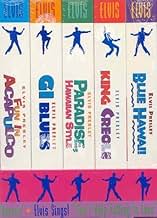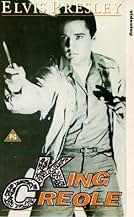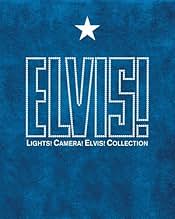VALUTAZIONE IMDb
7,0/10
6719
LA TUA VALUTAZIONE
Elvis Presley dà un nuovo ritmo a Bourbon Street in King Creole. Interpreta un giovane problematico la cui voce fa ballare tutto il quartiere francese.Elvis Presley dà un nuovo ritmo a Bourbon Street in King Creole. Interpreta un giovane problematico la cui voce fa ballare tutto il quartiere francese.Elvis Presley dà un nuovo ritmo a Bourbon Street in King Creole. Interpreta un giovane problematico la cui voce fa ballare tutto il quartiere francese.
Brian G. Hutton
- Sal
- (as Brian Hutton)
Leon Tyler
- Drug Clerk
- (scene tagliate)
Hazel Boyne
- Woman Asking for Water
- (non citato nei titoli originali)
Sam Buffington
- Dr. Martin Cabot
- (non citato nei titoli originali)
Boyd Cabeen
- Patron
- (non citato nei titoli originali)
Recensione in evidenza
If LOVING YOU (1957) seemed to me at times to play like a lighter version of A FACE IN THE CROWD (1957), this reminded me of another Elia Kazan masterpiece, ON THE WATERFRONT (1954) which is quite appropriate since this is one of Elvis Presley’s better and most popular vehicles and one of the few with genuinely talented Hollywood craftsmen behind them.
This was one of the earliest film adaptations of Harold Robbins novels – the most notable of which would prove to be THE CARPETBAGGERS (1964), THE ADVENTURERS (1970) and THE BETSY (1978; which I have on VHS but have yet to watch) – but, Hollywood being Hollywood, it had its Chicago setting relocated to New Orleans; the screenplay was co-scripted by Michael V. Gazzo who was then still fresh from the Broadway success of A HATFUL OF RAIN (later filmed by Fred Zinnemann in 1957) but is nowadays perhaps best-known for his Oscar-nominated performance in THE GODFATHER PART II (1974).
Elvis is backed by a rather stellar cast: once again, lovely Dolores Hart is featured as his love interest – when he’s not being ensnared by long-suffering gangster’s moll Carolyn Jones, which doesn’t sit at all well with vicious kingpin Walter Matthau (effectively cast as the sleek heavy of the piece); the older generation is represented by Dean Jagger, appearing as Elvis’ submissive pharmacist father and Paul Stewart playing the owner of the “King Creole” establishment (who eventually hitches up with Presley’s older sister) and the only one who’s unafraid to stand up to Matthau’s control of the territory and who signs up “busboy”/failed graduate Elvis when he’s revealed to be a talented singer. Other cast members making notable contributions are Vic Morrow as Matthau’s chief lackey/thug and an uncredited Gavin Gordon as Jagger’s bossy superior.
At almost two hours, the film is slightly overlong but the meatier-than-usual plot line, the tawdry atmosphere of the Deep South (vividly-captured through exemplary noir-ish lighting by Russell Harlan), the star’s own instinctive performance (clearly modeled after his Method-trained heroes Marlon Brando and James Dean), dazzling musical interludes (whose sheer power remains undimmed) and occasional bouts of violence keep one watching. It is said that KING CREOLE was also Elvis’ favorite among his own movies and, having now watched it myself, I can easily understand why.
This was one of the earliest film adaptations of Harold Robbins novels – the most notable of which would prove to be THE CARPETBAGGERS (1964), THE ADVENTURERS (1970) and THE BETSY (1978; which I have on VHS but have yet to watch) – but, Hollywood being Hollywood, it had its Chicago setting relocated to New Orleans; the screenplay was co-scripted by Michael V. Gazzo who was then still fresh from the Broadway success of A HATFUL OF RAIN (later filmed by Fred Zinnemann in 1957) but is nowadays perhaps best-known for his Oscar-nominated performance in THE GODFATHER PART II (1974).
Elvis is backed by a rather stellar cast: once again, lovely Dolores Hart is featured as his love interest – when he’s not being ensnared by long-suffering gangster’s moll Carolyn Jones, which doesn’t sit at all well with vicious kingpin Walter Matthau (effectively cast as the sleek heavy of the piece); the older generation is represented by Dean Jagger, appearing as Elvis’ submissive pharmacist father and Paul Stewart playing the owner of the “King Creole” establishment (who eventually hitches up with Presley’s older sister) and the only one who’s unafraid to stand up to Matthau’s control of the territory and who signs up “busboy”/failed graduate Elvis when he’s revealed to be a talented singer. Other cast members making notable contributions are Vic Morrow as Matthau’s chief lackey/thug and an uncredited Gavin Gordon as Jagger’s bossy superior.
At almost two hours, the film is slightly overlong but the meatier-than-usual plot line, the tawdry atmosphere of the Deep South (vividly-captured through exemplary noir-ish lighting by Russell Harlan), the star’s own instinctive performance (clearly modeled after his Method-trained heroes Marlon Brando and James Dean), dazzling musical interludes (whose sheer power remains undimmed) and occasional bouts of violence keep one watching. It is said that KING CREOLE was also Elvis’ favorite among his own movies and, having now watched it myself, I can easily understand why.
- Bunuel1976
- 20 ago 2007
- Permalink
Trama
Lo sapevi?
- QuizCo-star Walter Matthau said after the death of Elvis Presley this about him: ""He was an instinctive actor...He was quite bright...he was very intelligent...He was not a punk. He was very elegant, sedate, and refined, and sophisticated."
- BlooperCharacter starts running twice because of editing mistake in the end of movie.
- Citazioni
Ronnie: Maybe we'll meet some place by accident.
Danny Fisher: Well, you tell me where you think the accident will take place and I'll make sure I'm there.
- ConnessioniEdited into The Story of Elvis Presley (1977)
I più visti
Accedi per valutare e creare un elenco di titoli salvati per ottenere consigli personalizzati
- How long is King Creole?Powered by Alexa
Dettagli
Botteghino
- Lordo in tutto il mondo
- 3627 USD
- Tempo di esecuzione1 ora 56 minuti
- Colore
Contribuisci a questa pagina
Suggerisci una modifica o aggiungi i contenuti mancanti

Divario superiore
By what name was La via del male (1958) officially released in India in English?
Rispondi
























